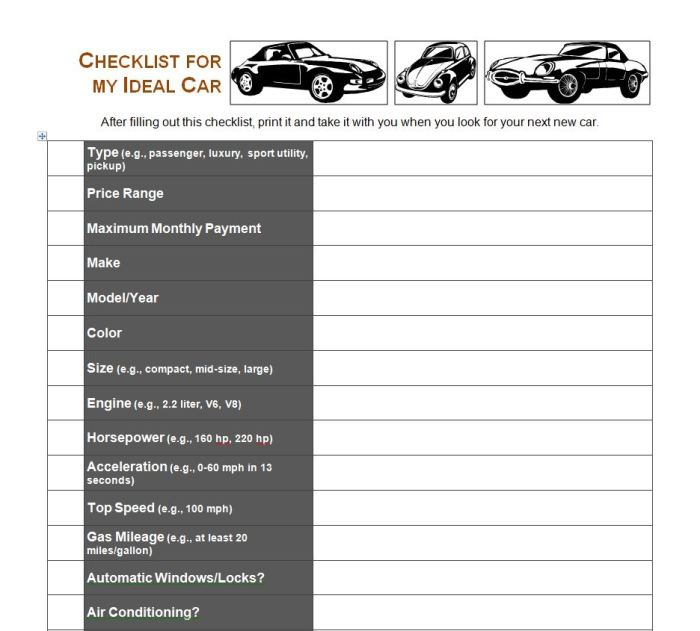Starting with Guide to purchasing used car from private seller, this introduction aims to provide a comprehensive overview of the key steps and considerations involved in buying a used car from a private seller.
Exploring topics such as researching the vehicle, meeting the seller, evaluating the car’s condition, negotiating the price, and more, this guide is essential for anyone looking to make an informed purchase decision.
Researching the Vehicle

When purchasing a used car from a private seller, researching the specific make and model is crucial to ensure you are making a well-informed decision.
Checking the Vehicle History Report
- Obtain the Vehicle Identification Number (VIN) from the seller.
- Use a reputable service like Carfax or AutoCheck to run a vehicle history report.
- Review the report for any red flags such as past accidents, title issues, or odometer discrepancies.
- Ensure the VIN on the report matches the VIN on the vehicle.
Inspecting the VIN Number
“The VIN number is like the car’s fingerprint, providing crucial information about its history and authenticity.”
- Locate the VIN on the dashboard near the windshield or inside the driver’s side door jamb.
- Check for any signs of tampering or alterations to the VIN plate.
- Verify that the VIN matches the one listed on the title, registration, and insurance documents.
- Use online databases to decode the VIN and understand the car’s manufacturing details.
Meeting the Seller
When purchasing a used car from a private seller, meeting the seller is a crucial step in the process. It not only allows you to inspect the vehicle in person but also gives you the opportunity to gather important information and assess the legitimacy of the seller.
Choosing a Safe and Public Location
Meeting the seller in a safe and public location is essential for your safety and peace of mind. Opt for places like a busy parking lot, a shopping center, or a police station. Avoid meeting in secluded areas or at the seller’s home to minimize risks.
- Ensure the location has good lighting and preferably CCTV cameras for added security.
- Inform a friend or family member about the meeting details and share your location with them.
- Avoid carrying large sums of cash and consider bringing someone along with you for added security.
Effective Communication with the Seller
When meeting the seller, communicate effectively to gather all necessary information about the car. Ask relevant questions about the vehicle’s history, maintenance records, reason for selling, and any past accidents or damages. Be attentive to the seller’s responses and look for any inconsistencies or red flags.
- Take notes during the conversation to ensure you don’t miss any important details.
- Request to see the car’s title, registration, and maintenance records to verify the information provided by the seller.
- Trust your instincts and if something feels off, consider walking away from the deal.
Conducting a Thorough Test Drive
Test driving the car is a crucial step in evaluating its condition and performance. Take the car for a spin on different road types to assess its handling, acceleration, braking, and overall comfort. Pay attention to any unusual noises, vibrations, or warning lights during the test drive.
- Check the brakes, steering, and suspension for any issues or signs of wear and tear.
- Test the air conditioning, heating, radio, and other features to ensure they are functioning properly.
- Drive the car at various speeds to gauge its performance on highways and in stop-and-go traffic.
Evaluating the Condition of the Car
When purchasing a used car from a private seller, it is crucial to thoroughly evaluate the condition of the vehicle to ensure you are making a wise investment. This involves inspecting both the exterior and interior of the car, as well as having a mechanic assess its mechanical components.
Exterior Inspection
Before finalizing the purchase, carefully examine the exterior of the car for any signs of damage or wear. Key areas to inspect include:
- Check the body panels for dents, scratches, or rust.
- Inspect the paint for any discoloration or fading.
- Look at the tires for tread wear and ensure they are properly inflated.
- Examine the lights to see if they are all working correctly.
Interior Inspection
When checking the interior of the car, pay close attention to any damages or issues that may affect your comfort or safety while driving. Here are some areas to focus on:
- Inspect the upholstery for tears, stains, or odors.
- Check the dashboard for any warning lights that may indicate underlying problems.
- Test all the electronic features, such as the radio, air conditioning, and power windows.
Importance of Mechanic Inspection
Having a qualified mechanic inspect the car is essential to identify any hidden mechanical issues that may not be visible to the untrained eye. To find a trustworthy mechanic for this task:
- Ask for recommendations from friends or family who have experience with car inspections.
- Look for certified mechanics or reputable auto repair shops in your area.
- Request a pre-purchase inspection to thoroughly assess the condition of the car’s engine, brakes, suspension, and other vital components.
Negotiating the Price: Guide To Purchasing Used Car From Private Seller

When it comes to negotiating the price of a used car from a private seller, there are several key strategies to keep in mind. By doing your research, understanding market values, and effectively communicating with the seller, you can increase your chances of reaching a fair deal. It’s crucial to approach the negotiation process with confidence and a clear understanding of what you are willing to pay for the vehicle.
Researching Market Value, Guide to purchasing used car from private seller
Before entering into negotiations with the seller, it’s essential to research the market value of the car you are interested in purchasing. Websites like Kelley Blue Book and Edmunds can provide you with valuable information on the fair market price for the make, model, year, and condition of the vehicle. This knowledge will give you a solid foundation for negotiating a fair price and ensure that you are not overpaying for the car.
Negotiation Strategies
- Start by offering a price slightly below the market value to leave room for negotiation.
- Point out any issues or discrepancies in the car’s condition that may warrant a lower price.
- Be respectful and courteous during the negotiation process to maintain a positive relationship with the seller.
- Consider offering to pay in cash or providing a pre-approved loan to show your seriousness as a buyer.
- Be prepared to walk away if the seller is unwilling to negotiate or meet your desired price.
Reviewing Sale Agreement
Before finalizing the purchase, it’s crucial to carefully review and understand the terms of the sale agreement. This document should Artikel the agreed-upon price, any additional fees, the condition of the car, and any warranties or guarantees provided by the seller. Make sure all the details are accurate and that you are comfortable with the terms before signing the agreement. If there are any discrepancies or concerns, address them with the seller before completing the transaction.
Final Wrap-Up
In conclusion, navigating the process of buying a used car from a private seller requires thorough research, effective communication, careful inspection, and smart negotiation. By following the tips and strategies Artikeld in this guide, you can confidently navigate this process and secure a great deal on your next vehicle purchase.
When it comes to the best luxury sedans for tall drivers, comfort and style are key. From spacious interiors to adjustable seating options, these vehicles cater to those who need extra legroom. Check out the best luxury sedans for tall drivers to find the perfect fit for your needs.
For families in search of the most reliable SUVs, safety and durability are top priorities. These vehicles offer ample space for passengers and cargo, making them ideal for road trips and daily commutes. Discover the most reliable SUVs for families that provide peace of mind on the road.